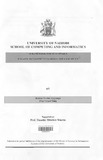| dc.description.abstract | This study focuses on the Responsibilities of various stakeholders in e-waste management in
Kenya, how the various stakeholders dispose of e-waste and challenges they face. It further
explores how other countries namely Switzerland, South Africa and India manage e-waste
and what lessons Kenya can learn. It explores the background to e-waste problem and how it
impacts on human health and environment.
E-waste poses serious negative health and environmental impacts. In spite of this, e-waste
generated in Kenya is not properly managed. This study outlines and examines e-waste
disposal practices by various stakeholders in Kenya and challenges they face. It also
examines the responsibilities of various stakeholders in e-waste management in Kenya.
Chapter 3 presents the research methodology used. Data for this study was collected using
questionnaires, interviews and discussions with key policy officers in government agencies,
recyclers, producers, consumers and collectors in Nairobi. Additionally secondary data was
collected from review of literature.
In Kenya no policies and procedures were found to be in place to enable the management of
electronic waste whereas these were present in Switzerland. In Kenya gaps were identified in
awareness levels, technology to manage e-waste, e-waste financing, collection, disposal, ewaste
policy and collaboration. It was found that Kenya does not have clearly laid out
strategies for managing electronic waste whereas such strategies do exist in Switzerland.
Amongst the three countries, Switzerland emerged as a good model of a country that has
updated its legal provision to enable the management of electronic waste. In India e-waste
management systems has organically developed from the informal sector and has created
employment opportunities and income. In spite of the challenges faced, South Africa has
taken great strides towards developing policies, procedures, strategies and legislation for the
management of electronic waste. Kenya is seen as lagging behind in these areas. | en |

